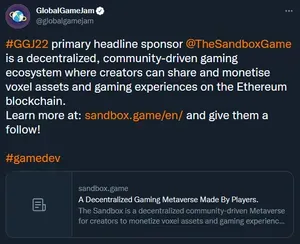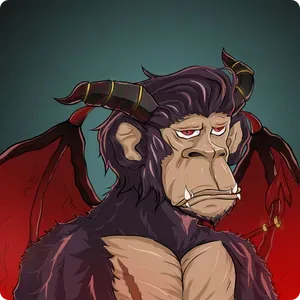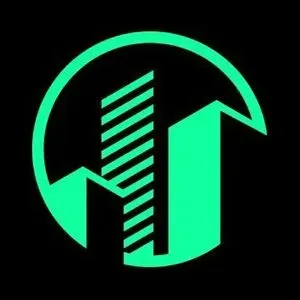Token drop for the aptly named WTF token devolves into chaos
fees.wtf, a platform allowing people to see how much money a given cryptocurrency wallet has spent in gas fees, decided it was time to release their own token, and promised to follow it up with NFTs. They tempted people with an initial airdrop, where people recruited their friends in exchange for more "WTF" tokens. However, with a small initial liquidity pool and trading bots quickly entering the fray, enormous volatility led to absolute chaos. Some traders who were unfamiliar with setting up tolerances for slippage found their orders executed for substantially less than expected, with one user trading 42 ETH ($135,000) for what ended up being less than 1¢ of WTF. Edward Ongweso Jr wrote for Vice, "Like so many other crypto projects, it was so poorly planned, capitalized, and executed, that it's almost indistinguishable from a scam."
Global Game Jam plugs their blockchain company sponsor, then tries to scrub mention of it after backlash
Global Game Jam, an annual event where people collaborate to make video games, proudly plugged The Sandbox as their "primary headline sponsor" on Twitter. The Sandbox is a platform for selling game assets on the Ethereum blockchain. After swift backlash, GGJ deleted the tweet and deleted references to blockchains from The Sandbox's description in their sponsor list. Needless to say this didn't go unnoticed, appearing to many as an attempt to deceive their community. GGJ eventually apologized for this action, and dropped The Sandbox as a sponsor.
NFT developers rugpull for a third time, this time with "Big Daddy Ape Club"
The creators of "Big Daddy Ape Club" rug pulled shortly after mint, deleting their social media and website and making off with around $1.2 million. The project's creators were reportedly the same as those who'd pulled off the $2 million "Baller Ape Club" rug pull in October 2021, and a $150,000 one before that.
The Associated Press announces its bizarre plans for an NFT marketplace
I can safely describe most NFT marketplaces as bizarre, but the AP is really trying to top the bunch. The marketplace will provide a place for trading the NFTs they plan to create out of their journalistic photography. However, people won't be able to move the NFTs they purchase to other marketplaces (so much for decentralized). Dwayne Desaulniers, AP's Director of Blockchain & Data Licensing, attempted to shed some light on their plans via Twitter, only making things worse. "Buying an AP photo registered on the blockchain provides you with a personal license to display, print, resell the image if you wish. But is also helps reduce the economic damage from digital theft, preserves the value of a photograph and will help us fight deep fakes", he said, though basically none of these claims stand up to scrutiny, or particularly require a blockchain.
Members of a DAO hoping to build an Ethereum city in Wyoming are scammed out of around $100,000
Crypto investors who bought 40 acres of land in Wyoming in hopes of "building a city on the Ethereum blockchain" lost more than $92,000 to a Discord hack. Some clever social engineering and questionable security measures on Discord's part allowed scammers to gain control of a CityDAO Discord moderator's account, then send out fake announcements about a fake "land drop". The scammer received over 29.67 ETH (about $92,000).
Sports NFT platform Lympo loses $18.7 million to a breach
Animoca Brands' subsidiary Lympo, an NFT platform specifically for sports, experienced a breach of several hot wallets. This allowed an attacker to pull 165.2 LMT tokens from the platform, equivalent to about $18.7 million. The tokens were quickly exchanged for Ether on Uniswap and Sushiswap. The hack caused the value of LMT to drop by 92%, to $0.0093.
Celebrity-promoted Rich Dwarves Tribe NFT project rug pulls for around $3 million
The Rich Dwarves Tribe was an NFT project announced in December 2021, which minted in January 2022. The project had been heavily promoted by musicians including NeYo, Jason Derulo, BowWow, and Fred Durst. It promised a metaverse "tavern", giveaways, a crypto project incubator, and NFTs that would "mine coins for you". However, shortly after the project minted out, its creators disappeared with the funds and abandoned the project.
Developers of the Frosties NFT project make off with about $1.1 million
An hour after releasing their ice cream-themed NFTs, developers of the Frosties NFT project closed their social media accounts and disappeared with $1.1 million, plunging the token value to nearly zero.
Doodled Dragons takes at least $30,000 after tweeting "our charity will instead now be... my bank account"
A SolSea-verified NFT project on the Solana blockchain, Doodled Dragons, touted that they would distribute all profits "straight to charities protecting animals on the brink of extinction". They announced on Twitter that they would be donating $30,000, "our first donation", to the World Wildlife Fund. Two hours later, they tweeted, "actually. fuck that. our charity will instead now be... my bank account. cya nerds." They deleted the Twitter account shortly after.
$6.8 million emptied from crypto exchange LCX
The Liechtenstein-based cryptocurrency exchange LCX suffered a $6.8 million loss when one of its hot wallets was compromised. Assets including ETH, USDC, EURe, and LCX were moved to an Ethereum wallet belonging to the attacker, then quickly tumbled using the Tornado Cash mixing service.









